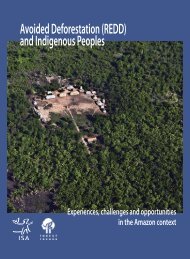BASELINE STUDY 5, Thailand - Forest Trends
BASELINE STUDY 5, Thailand - Forest Trends
BASELINE STUDY 5, Thailand - Forest Trends
Create successful ePaper yourself
Turn your PDF publications into a flip-book with our unique Google optimized e-Paper software.
National wood management and tracking systems are relatively systematic, but imports are underregulated:<br />
<strong>Thailand</strong> already maintains a rather rigorous national management system for the wood industry,<br />
with systematic documentation of importation, transportation, processing and export of wood and wood<br />
products. While these rules and regulations are indeed effective overall in protecting the country’s forests (albeit<br />
with a number of small-scale illegal logging cases), other gaps remain. For example, <strong>Thailand</strong> does not seek<br />
to regulate the legal status of logs or sawnwood sourced from regional countries with known forest governance<br />
problems, including Myanmar, Laos, Cambodia and Malaysia. A wood import ban overland from Myanmar was<br />
executed after the infamous 1997 so-called Salween Scandal to ensure that Thai logs were not being sent<br />
across the Myanmar border and then returned into <strong>Thailand</strong>, a ruse used to get around the Thai logging ban.<br />
But this has since been overturned and only an official certificate of origin is needed by customs.<br />
Overall low awareness of certified/verified legal wood products: Much of the processed wood industry relies<br />
upon domestic industrial tree plantations, and the construction sector—using imported hardwoods— does not<br />
require any documentation of legal origin or compliance. Only the wood furniture export business seems oriented<br />
towards these concerns, as their customers in Japan, USA, and EU are beginning to demand such timber<br />
legality guarantees.<br />
<strong>Thailand</strong>’s FIO secured <strong>Forest</strong> Stewardship Council (FSC) certification for two plantation sites in 2001, although<br />
these were revoked in 2003 (WRM, 2003). FIO regained FSC certification for 4 teak producing forest management<br />
sites in Lampang and Phrae provinces, in 2008, totalling over 11,000 hectares (Smartwood, 2008). In addition,<br />
by 2011 there were 35 Thai wood processing companies holding FSC Chain of Custody certificates.<br />
Lack of data: Data on <strong>Thailand</strong>’s wood industry remains somewhat opaque. While customs data on imports<br />
and exports published by the Royal Thai Government are easily obtained, the government does not appear to<br />
collect or publish much of the data that would be necessary for a deeper analysis and understanding of the forest<br />
industry, and available information is often out-dated or conflicting. From 2005, RFD and Ministry of Natural<br />
Resources and the Environment (MNRE) have listed the number of illegal logging cases 2 (in Thai). It is difficult to<br />
ascertain the acreage and per annum volumes harvested in the plantation sector, as inventory survey data for<br />
the smallholder sector is not collected. While the government has implemented various programs to subsidize<br />
smallholder tree farms, little monitoring or certification has followed.<br />
Strong civil society operating in the forest sector: <strong>Thailand</strong> has a well-organized civil society sector that is very<br />
active in forestry, environment and social justice issues. However, many of these groups have remained focused<br />
on community-based programs and have not often participated in national or international forest governance<br />
policies and initiatives, such as certification systems or the promotion of sustainable economic forestry.<br />
The status of the Thai Community <strong>Forest</strong>ry Bill remains in limbo after more than 15 years of negotiations.<br />
2 Available at: http://web2.forest.go.th/stat/; http://web2.forest.go.th/stat/stat52/stat2552.html;<br />
http://www.dnp.go.th/statistics/.<br />
© EU FLEGT Facility, <strong>BASELINE</strong> <strong>STUDY</strong> 5, <strong>Thailand</strong>: Overview of <strong>Forest</strong> Law Enforcement, Governance and Trade, July 2011<br />
This Action is funded by the European Union and the governments of Finland, France, Germany, the Netherlands, Spain and the UK. The views expressed herein<br />
can in no way be taken to reflect the official opinion of the European Union.<br />
www.euflegt.efi.int<br />
9
















